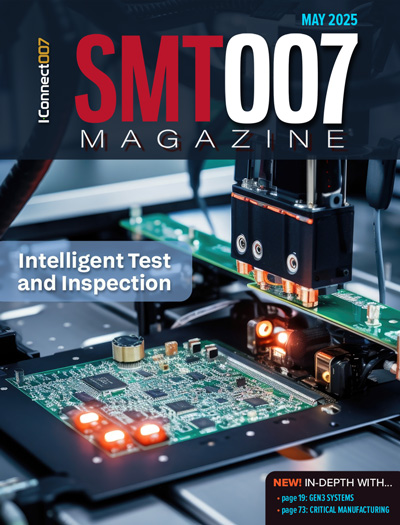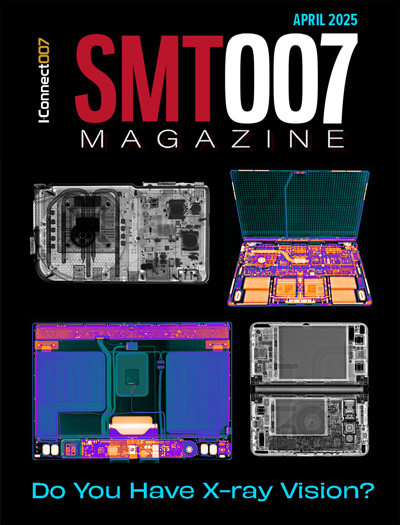-

- News
- Books
Featured Books
- smt007 Magazine
Latest Issues
Current Issue
Intelligent Test and Inspection
Are you ready to explore the cutting-edge advancements shaping the electronics manufacturing industry? The May 2025 issue of SMT007 Magazine is packed with insights, innovations, and expert perspectives that you won’t want to miss.

Do You Have X-ray Vision?
Has X-ray’s time finally come in electronics manufacturing? Join us in this issue of SMT007 Magazine, where we answer this question and others to bring more efficiency to your bottom line.

IPC APEX EXPO 2025: A Preview
It’s that time again. If you’re going to Anaheim for IPC APEX EXPO 2025, we’ll see you there. In the meantime, consider this issue of SMT007 Magazine to be your golden ticket to planning the show.
- Articles
- Columns
Search Console
- Links
- Media kit
||| MENU - smt007 Magazine
BrainChip, Frontgrade Gaisler to Augment Space-Grade Microprocessors with AI Capabilities
May 6, 2024 | BUSINESS WIREEstimated reading time: 2 minutes
BrainChip Holdings Ltd, the world’s first commercial producer of ultra-low power, fully digital, event-based, neuromorphic AI IP, and Frontgrade Gaisler, a leading provider of space-grade system-on-chip solutions, announce their collaboration to explore the integration of BrainChip’s AkidaTM neuromorphic processor into Frontgrade Gaisler’s next generation fault-tolerant, radiation-hardened microprocessors. This collaboration represents a significant milestone as it aims to introduce the first space-grade SoC worldwide with incorporated true artificial intelligence (AI) capabilities.
These next generation microprocessors would include BrainChip’s AI processing capabilities, thereby enabling a considerable step forward in the computing resources available for space-borne systems. In particular, the inclusion of the Akida neuromorphic processor aims to deliver compelling power efficiency and inference performance while maintaining compatibility with existing Convolutional Neural Networks (CNNs).
“Adding AI capabilities to our next generation microprocessors would set a new standard for modern space-grade computing devices,” said Sandi Habinc, General Manager at Frontgrade Gaisler. “The success of this joint effort could empower organizations to leverage AI technology to enhance mission efficiency, ultimately advancing the frontiers of what is possible in space.”
Space programs are increasingly turning to neuromorphic AI technology to overcome the latency and power consumption demands that are hindering those within the sector. The goal in integrating AI and neuromorphic computing into space technology is to strengthen deployments that require more autonomy and adaptability by providing the ability to learn on device and adapt in environments with constantly changing variables.
“Ensuring the availability, accessibility and reliability of technology and devices utilized as part of spacecraft platforms and payloads is of utmost importance for the Agency and its state-of-the-art space missions,” said Ali Zadeh, Head of the Data Systems & Microelectronics Division at the European Space Agency. “Integrating neuromorphic capabilities in a space-grade SoC represents an exciting technological avenue for the next generation of space applications. A collaboration between Frontgrade Gaisler and BrainChip to utilize such advanced technologies for space is therefore very encouraging.”
“When we say that we are dedicated to growing AI everywhere, we mean it,” said Sean Hehir, CEO of BrainChip. “From everywhere on earth, to the edge of space, we are committed to helping develop devices that can provide the low cost, efficiency and on-sensor intelligence required in the most extreme conditions. Those participating in this latest leg of the Space Race will find a tremendous advantage in leveraging neuromorphic technology to overcome the challenges that would otherwise keep their missions grounded, or at least, limited.”
Suggested Items
TT Electronics' Cleveland Ohio Facility Re-Certified to Aerospace and Defence Standards AS9100 and Nadcap
05/23/2025 | TT ElectronicsTT Electronics has successfully completed recertification of the Cleveland facility to AS9100 and Nadcap standards. This milestone underscores the company’s unwavering dedication to quality in manufacturing for the aerospace and defence sectors, a commitment proudly upheld for more than 15 years.
Geospace Unveils New Brand Identity Reflecting the Company’s Move into Diverse Markets
05/20/2025 | BUSINESS WIREGeospace Technologies Corporation announces a new brand identity, reflecting the company's transformation of its leadership and culture along with a redefined strategy focused on applied intelligent technology.
Foxconn, Thales Group Announce Strategic Partnership in Semiconductor and Space
05/20/2025 | FoxconnHon Hai Technology Group (Foxconn) on Monday announced a strategic partnership with Thales Group of France in the fields of semiconductors and space, a move that deepens the industrial expertise and broadens the European footprint of the world’s largest electronics manufacturing service provider.
Federal Electronics Adds AS9100 Certification to Hermosillo, Mexico Facility, Expanding Aerospace & Defense Capabilities
05/20/2025 | Federal ElectronicsFederal Electronics, a leader in providing advanced electronic manufacturing services, has officially added AS9100 certification to its Hermosillo, Mexico facility, further aligning its operations with the quality standards required by the aerospace and defense industries.
Airbus Next-Generation Skynet Satellite Reaches Major Milestone
05/20/2025 | AirbusThe UK’s next-generation military communications satellite—Skynet 6A—has successfully completed the coupling of its communications and service modules. "This significant development in the programme will allow Airbus to complete final baseline testing at our Stevenage site, followed by environmental testing back at NSTF later this year," said Airbus Defence and Space UK Chairman Ben Bridge.


